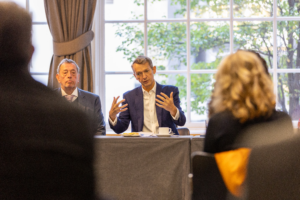New courses open for registration
Introduction to Forensic Science
University of Strathclyde
Start date: 05 January
Length: 6 weeks, 3 hours per week
/courses/introduction-to-forensic-science-2
A murder case set on the murky shores of Loch Lomond in Scotland provides the backbone to ‘Introduction to Forensic Science’. As the case unfolds each week, a number of evidence types, and the forensic science approaches that may be used to evaluate the evidence, are explored. In the first week we will look at how the initial crime scene is processed. Subsequent weeks will introduce various types of evidence including drugs of abuse, fingerprints, DNA, footwear marks and firearms. All will be revealed in the final week, including the identity of the murderer.
Make an Impact: Sustainability for Professionals
University of Bath
Start date: 12 January
Length: 6 weeks, 3 hours per week
/courses/sustainability-for-professionals-2
This course covers the basic definitions and history of sustainable development and sustainability in business from a niche interest to the present day, where businesses routinely incorporate sustainable development via corporate social responsibility policies, product innovation and new business models. You will be involved in investigating a number of topics which you’ll then be able to apply to the development of your own sustainable development strategy. We’ll explore the key drivers to sustainability, the use of standards, the importance of stakeholder engagement, governance (including the use of codes of conduct), innovation for sustainability, the use of metrics and indicators and the application of management tools. We’ll also touch on international perspectives towards sustainable development and how these impact on business activities around the world.
Managing People: Engaging Your Workforce
University of Reading
Start date: 12 January
Length: 10 weeks, 4 hours per week
/courses/managing-people-2
This course is aimed at people who have, or are about to have, managerial responsibility in any type of organisation, introducing you to reflective practice in people management. It will arm you to deal more effectively with the challenges you regularly face. It will provide you with different ways of looking at difficult situations and will give you a broader range of techniques to use when dealing with them. We will cover aspects of management theory and psychology, but our premise is that management is as much an art as it is a science. We cannot make you a great artist in ten weeks but we can set you on the path.
Climate Change: Challenges and Solutions
University of Exeter
Start date: 12 January
Length: 8 weeks, 3 hours per week
/courses/climate-change-challenges-and-solutions-2
The course will set contemporary human-caused climate change within the context of past nature climate variability. Then it will take a risk communication approach, balancing the ‘bad news’ about climate change impacts on natural and human systems with the ‘good news’ about potential solutions. These solutions can help avoid the most dangerous climate changes and increase the resilience of societies and ecosystems to those climate changes that cannot be avoided.
Elements of Renewable Energy
The Open University
Start date: 12 January
Length: 4 weeks, 3 hours per week
/courses/elements-renewable-energies
During this course we study renewable energy using the four Greek elements as our weekly themes: earth, air, fire and water. Renewable energy sources have been used for centuries, in water mills, windmills and wood stoves, but in recent years we’ve developed the technology to use these natural power sources on a much larger scale. When you’ve completed this course you should have an improved understanding of how some key renewable energy technologies work and the contribution they might make to world needs.
Exploring English: Language and Culture
British Council
Start date: 02 February
Length: 6 weeks, 2 hours per week
/courses/explore-english-language-culture-2
This course is for people who are learning English and who are interested in finding out more about British culture and improving their English language skills. Different topics will be introduced each week, including English as a global language, the environment, entrepreneurship and literature. Filmed in Great Britain, these videos will help you to develop your listening skills as you watch authentic examples of people speaking English. The course does not follow a language syllabus but takes authentic English in context as its starting point.
Begin Programming: Build Your First Mobile Game
University of Reading
Start date: 02 February
Length: 7 weeks, 3 hours per week
/courses/begin-programming-4
This course will help you to understand how programs work and guide you through creating your own computer program – a mobile game. Whether you’re a complete newcomer to programming, or have some basic skills, this course provides a challenging but fun way to start programming in Java. We will introduce the basic constructs that are used in many programming languages and help you to put this knowledge into practice by changing the game code we have provided. You’ll have the freedom to create a game that’s unique to you, with support from the community and educators if you get stuck. You’ll learn how to create algorithms to solve problems and translate these into code, using the same tools as industry professionals worldwide. At the end of the course you’ll have a complete game that can be played on an Android phone or tablet, or even your computer.
Water for Liveable and Resilient Cities
Monash University
Start date: 02 March
Length: 7 weeks, 4 hours per week
/courses/liveable-cities
Water plays a central role in almost every aspect of our urban environment and quality of life in our cities. Alarmingly, the combined impacts of rapid population growth and climate change are now posing a severe threat to the liveability and resilience of our cities. However, it’s possible to design water systems that provide cities with the capacity to cope with these threats. Water sensitive urban design creates water sensitive cities that enhance and protect the health of watercourses and wetlands; mitigate flood risk and damage; and create public spaces that harvest, clean and recycle water. This approach poses complex planning and urban design challenges which require solutions that address equally complex and interrelated considerations, such as social, environmental, political, economic, planning and engineering disciplines. You’ll be asked to consider and discuss the latest solutions and concepts on urban design and modelling, climate change adaptation, behaviour change, and social and government engagement.


